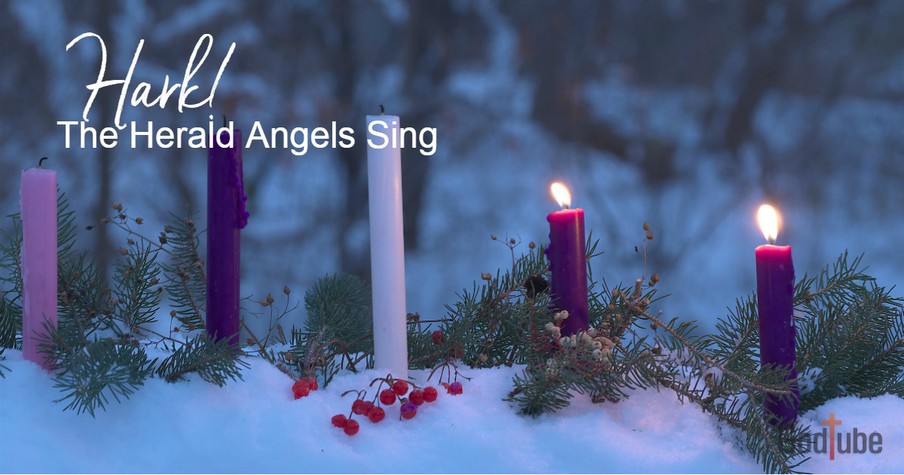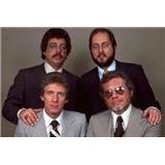Hark! The Herald Angels Sing
by Andrew Rinaldi

Hark! the Herald Angels Sing Lyrics
Hark the herald angels sing
"Glory to the newborn King!
Peace on earth and mercy mild
God and sinners reconciled"
Joyful, all ye nations rise
Join the triumph of the skies
With the angelic host proclaim:
"Christ is born in Bethlehem"
Hark! The herald angels sing
"Glory to the newborn King!"
Christ by highest heaven adored
Christ the everlasting Lord!
Late in time behold Him come
Offspring of a Virgin's womb
Veiled in flesh the Godhead see
Hail the incarnate Deity
Pleased as man with man to dwell
Jesus, our Emmanuel
Hark! The herald angels sing
"Glory to the newborn King!"
Hail the heaven-born Prince of Peace!
Hail the Son of Righteousness!
Light and life to all He brings
Ris'n with healing in His wings
Mild He lays His glory by
Born that man no more may die
Born to raise the sons of earth
Born to give them second birth
Hark! The herald angels sing
"Glory to the newborn King!"
The Story Behind Hark! The Herald Angels Sing
When Charles Wesley wrote this carol in 1739, he had no idea it would become famous. He first named it “Hark, how all the welkin ring,” welkin being an archaic English term for the heavens. When George Whitefield published it in 1753, he changed the first line to read, “Hark! The herald angels sing,” and so it has remained that way ever since.
For the first 120 years, the words were sung to various tunes. But that changed in 1856 when William Cummings joined the lyrics with a tune written by Felix Mendelssohn for the Gutenberg Festival in 1840 to celebrate the introduction of printing. Mendelssohn would be surprised by that because he had written that his tune would be welcomed by singers and hearers, “but it will never do to sacred words.”
Charles Wesley’s hymn offers us a good survey of theology. It mentions many of the names and titles of Christ: King, Lord, Prince of Peace, Sun of Righteousness, Everlasting Lord, Desire of Nations, Incarnate Deity, and Emmanuel. After the first stanza’s call to praise “the new-born King,” the following stanzas celebrate the virgin birth, the deity of Christ, the resurrection of the body, and the truth of the new birth. Two phrases, in particular, deserve comment: “Mild he lays his glory by” refers to Christ’s willingness to lay aside the glory of heaven to take on human nature and become one of us. “Late in time behold him come” reminds us of Hebrews 1:2 where we are told “in these last days” God has spoken to us through his Son.
Used with permission from Christianity.com
Watch our favorite performances of "Hark! The Herald Angels Sing" below!
Collection of Popular Christmas Hymns and Carols:
O Come, O Come, Emmanuel
The First Noel
Joy To The World
O Holy Night
Hark! The Herald Angels Sing
Silent Night
O Come All Ye Faithful
Go Tell It On The Mountain
What Child Is This
O Little Town of Bethlehem
We, Three Kings of Orient, Are
Today's Devotional
A Prayer for Victory over Sinful Thoughts - Your Daily Prayer - July 26
Victory over sinful thoughts starts with dependence upon God to stay free from enslaving sin. It’s a life lived with a surrendered mouth and heart before God. Winning requires us to remember our Rock, who rescues us and gives us a firm standing place, and our Redeemer, who rescues us from total loss.
Top Music Videos

The Statler Brothers 'Til the Storm Passes By' The Statler Brothers Live Performance

Universal Music Group Brooke Ligertwood - Bless God

Danny Gokey Danny Gokey - Open Up The Gates

Crowder Crowder - Somebody Prayed

Universal Music Group Stephen Stanley - Lean On Me









